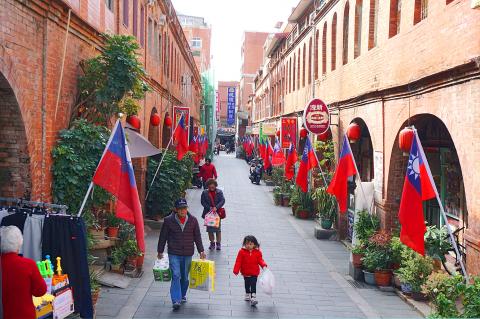A potter in Kinmen County yesterday said that he and a borough official removed People’s Republic of China (PRC) flags from a street where they have hung them for fear of contravening the Anti-infiltration Act (反滲透法).
Wang Ming-tsung (王明宗), who works in Jincheng Township (金城), said that Republic of China (ROC) and PRC flags have flown along Mofan Street since 2018, but passage of the act on Tuesday prompted the immediate removal of the Chinese flags.
Wang said that since 2003, he has been flying the PRC flag over his store, which popularized the sight of it in Kinmen.

Photo: CNA
In 2018, he and Dongmen Borough (東門) Warden Tsai Hsiang-kun (蔡祥坤) began lining the streets with both flags, Wang said.
“The idea was to create a ho spot to promote tourism,” Wang said.
They helped boost local tourism, which benefited the community, he said.
Flying PRC flags on either side of Mofan Street emphasized the difference between democracy and autocracy, Wang said.
The PRC flags were removed in October last year in observance of Double Ten National Day, but were restored in November, he said.
However, passage of the act — which aims to prevent meddling by external hostile forces, and ensure national security and social stability — might make flying the Chinese flag a problem, he said.
Many Taiwanese visitors were amazed at the PRC flags and said they would not be seen on Taiwan proper, he said.
“Like Taiwanese who are excited to see their national flag abroad, Chinese tourists also feel more welcome when they see their flag in Taiwan,” Wang said.
Kinmen’s tourism industry has suffered from a decline in Chinese visitors that began last year, he said.
Tsai said that the political atmosphere has changed, but they still have to abide by the law, apparently a reference to the act passed by the legislature on Tuesday.
Kinmen, a few kilometers off the Chinese coast, is a traditional stronghold of Chinese Nationalist Party (KMT), and County Commissioner Yang Cheng-wu (楊鎮浯) is a member of the party.
They would wait to see the results from the elections on Saturday next week before deciding whether to restart the flag tradition, Tsai said.
A Mofan Street store owner surnamed Hsu (許) said that it did not matter what flag was flying over her business, as long as she made money.
A visitor from Taiwan proper had accused her of being a sellout because she was flying the PRC flag, Hsu said.
It is “ridiculous that one could be accused of being a sellout because of a flag,” she said.
A clothing designer surnamed Hsu (許) said it was “out of place” to see PRC flags in Taiwan.
People should not treat the liberties that come with democracy so casually, the designer said, adding that if people truly sought to espouse the spirit of democracy, they should fly the ROC flag in China.

Alain Robert, known as the "French Spider-Man," praised Alex Honnold as exceptionally well-prepared after the US climber completed a free solo ascent of Taipei 101 yesterday. Robert said Honnold's ascent of the 508m-tall skyscraper in just more than one-and-a-half hours without using safety ropes or equipment was a remarkable achievement. "This is my life," he said in an interview conducted in French, adding that he liked the feeling of being "on the edge of danger." The 63-year-old Frenchman climbed Taipei 101 using ropes in December 2004, taking about four hours to reach the top. On a one-to-10 scale of difficulty, Robert said Taipei 101

Nipah virus infection is to be officially listed as a category 5 notifiable infectious disease in Taiwan in March, while clinical treatment guidelines are being formulated, the Centers for Disease Control (CDC) said yesterday. With Nipah infections being reported in other countries and considering its relatively high fatality rate, the centers on Jan. 16 announced that it would be listed as a notifiable infectious disease to bolster the nation’s systematic early warning system and increase public awareness, the CDC said. Bangladesh reported four fatal cases last year in separate districts, with three linked to raw date palm sap consumption, CDC Epidemic Intelligence

Two Taiwanese prosecutors were questioned by Chinese security personnel at their hotel during a trip to China’s Henan Province this month, the Mainland Affairs Council (MAC) said yesterday. The officers had personal information on the prosecutors, including “when they were assigned to their posts, their work locations and job titles,” MAC Deputy Minister and spokesman Liang Wen-chieh (梁文傑) said. On top of asking about their agencies and positions, the officers also questioned the prosecutors about the Cross-Strait Joint Crime-Fighting and Judicial Mutual Assistance Agreement, a pact that serves as the framework for Taiwan-China cooperation on combating crime and providing judicial assistance, Liang

US climber Alex Honnold left Taiwan this morning a day after completing a free-solo ascent of Taipei 101, a feat that drew cheers from onlookers and gained widespread international attention. Honnold yesterday scaled the 101-story skyscraper without a rope or safety harness. The climb — the highest urban free-solo ascent ever attempted — took just more than 90 minutes and was streamed live on Netflix. It was covered by major international news outlets including CNN, the New York Times, the Guardian and the Wall Street Journal. As Honnold prepared to leave Taiwan today, he attracted a crowd when he and his wife, Sanni,